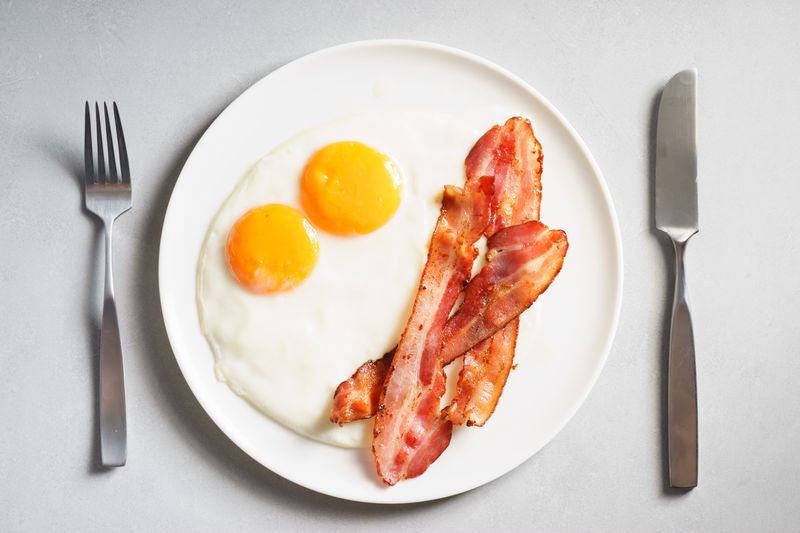10 Food Items You Should Never Combine With Eggs

Eggs are a breakfast staple cherished by many, often paired with various foods to enhance flavors and nutrition. However, not all combinations are beneficial. Some pairings can lead to digestive discomfort, nutritional imbalance, or just an overwhelming meal experience. Here’s a curated list of 10 food items that you might want to avoid combining with eggs, each with its unique reasons and detailed insights.
1. Processed Meats

Processed meats like bacon and sausage often grace breakfast tables alongside eggs. While this duo is tempting, processed meats are loaded with sodium, nitrates, and unhealthy fats. These elements can transform your breakfast into a heavy, inflammatory start to the day.
Imagine a meal that leaves you feeling bloated and sluggish, rather than energized. The combination can lead to increased inflammation in the body, which is not ideal for a morning routine. Opting for lean protein alternatives might be a more balanced choice for your eggs.
Avoid making processed meats your go-to egg companion.
2. Refined Carbs

Refined carbs, like white toast, bagels, or sugary pastries, are a common sight on breakfast tables. Paired with eggs, they might seem like a satisfying meal. However, these carbs spike blood sugar levels, giving a temporary sense of fullness.
Soon after, you might find yourself hungry again, reaching for snacks. This combination creates a calorie-dense meal lacking essential fiber. This imbalance can lead to energy crashes, disrupting your morning productivity.
Consider whole grain options to support your nutritional needs and maintain steady energy levels throughout the day.
3. Cheese

Cheese and eggs are a popular culinary match, but moderation is key. When you pile on cheese, the meal becomes rich in saturated fat, overshadowing its nutritional value. This can slow down digestion, leaving you feeling heavy.
Imagine a morning where your breakfast sits in your stomach like a rock, slowing your start. Excess cheese with eggs can lead to sluggish digestion and an overloaded calorie count.
For a healthier balance, consider using cheese sparingly, allowing the eggs’ natural flavors to shine through and promoting easier digestion.
4. High-sugar fruit juices

Pairing a glass of high-sugar fruit juice with eggs might seem like a wholesome choice. However, these juices, like orange or apple, are packed with sugars that can lead to a rapid blood sugar spike.
While the initial energy rush might feel refreshing, it often results in a crash, leaving you tired. This combination can disrupt your blood sugar levels, especially when paired with protein-rich eggs.
Opting for whole fruits or reducing juice consumption can help maintain energy balance and prevent mid-morning slumps.
5. Beans

Beans in heavy sauces might sound delicious with eggs, especially in dishes like a hearty breakfast burrito. However, this combination can turn overwhelming. The richness of the sauce, combined with beans’ natural heaviness, can lead to bloating.
Imagine starting your day with a meal that feels like it sits heavily in your stomach. The dense nature of this pairing can slow digestion, causing discomfort.
Choosing lighter bean preparations or consuming them separately might offer a more pleasant breakfast experience without compromising on taste.
6. Milk

Egg dishes made creamy with milk, such as quiches or rich scrambled eggs, can be a delightfully indulgent breakfast. Yet, for those with lactose sensitivity, this combination may pose digestive challenges.
The creaminess can make these dishes harder to digest, leading to discomfort. Picture a meal that lingers uncomfortably long after your last bite.
Consider alternatives like lactose-free products or reducing milk content to enjoy your egg dishes without the digestive aftermath, making mornings more enjoyable and free from discomfort.
7. Spicy hot sauce

Adding a splash of spicy hot sauce on your eggs can elevate flavors, but proceed with caution. Excessive hot sauce might irritate the stomach lining, especially combined with high-protein eggs.
Imagine starting your day with a fiery meal that leaves your stomach churning. While a few dashes might add a kick, drowning your eggs can lead to discomfort.
Balancing spice levels ensures that your breakfast remains enjoyable without compromising your stomach’s well-being, allowing you to savor the flavors without regret.
8. Fried potatoes

Eggs and fried potatoes are a diner favorite, but this combination might not be as beneficial as it seems. Deep-fried potatoes like hash browns add excess grease to your meal, ramping up your fat intake.
Imagine a breakfast that leaves you feeling sluggish rather than invigorated. The greasy nature of this pairing can make digestion slow and uncomfortable.
Opting for baked or lightly sautéed potatoes instead can provide the comfort of a classic breakfast without the heavy, greasy aftermath, promoting a more energetic start to your day.
9. Yogurt

Combining protein-rich yogurt with eggs might sound like a powerhouse breakfast, but it can be heavy for some. This pairing could lead to digestive discomfort, especially in the morning.
Imagine starting your day with a meal that feels too dense, causing bloating. The protein overload might not sit well with everyone, affecting comfort and energy levels.
Exploring lighter options or spacing out protein intake throughout the morning can provide a balanced start, keeping your digestion smooth and your energy levels stable.
10. Bananas

Eggs and bananas are both breakfast staples, yet they digest at contrasting speeds. Bananas, with their quick digestion, paired with the slower-digesting eggs, can lead to discomfort for some.
Picture a morning where this mismatch causes bloating or stomach unease. The contrasting speeds can create an imbalance in your digestive rhythm, affecting your day’s start.
Considering separate consumption might help maintain comfort, allowing you to enjoy both without digestive repercussions, ensuring a smoother and more pleasant breakfast experience.
